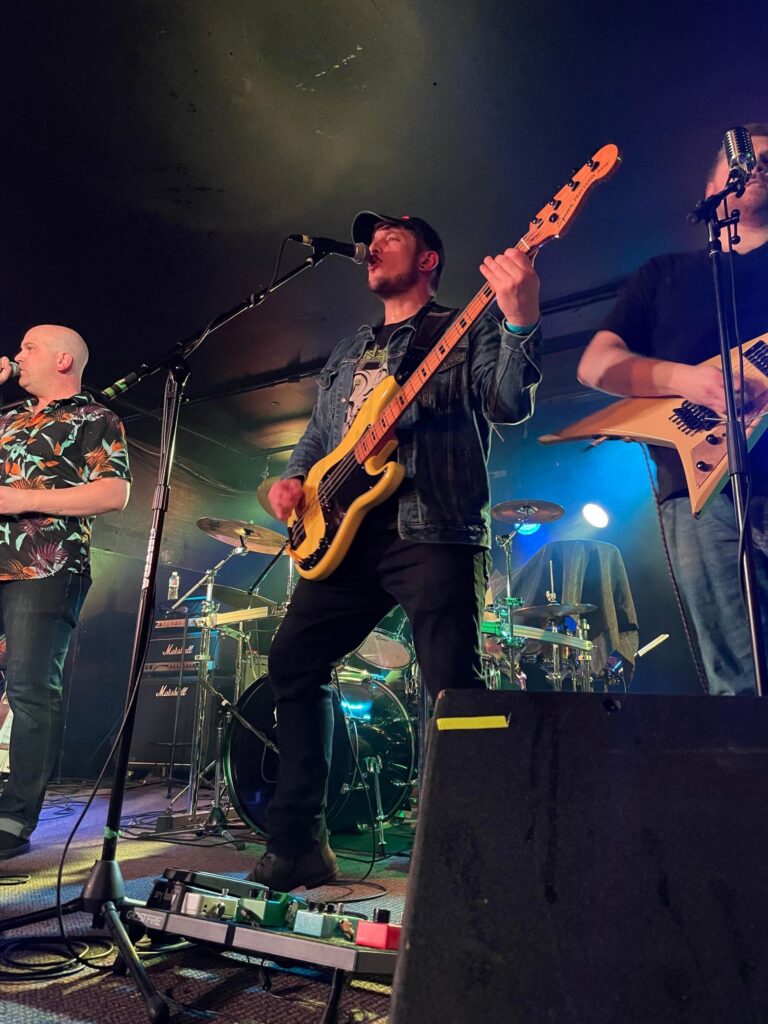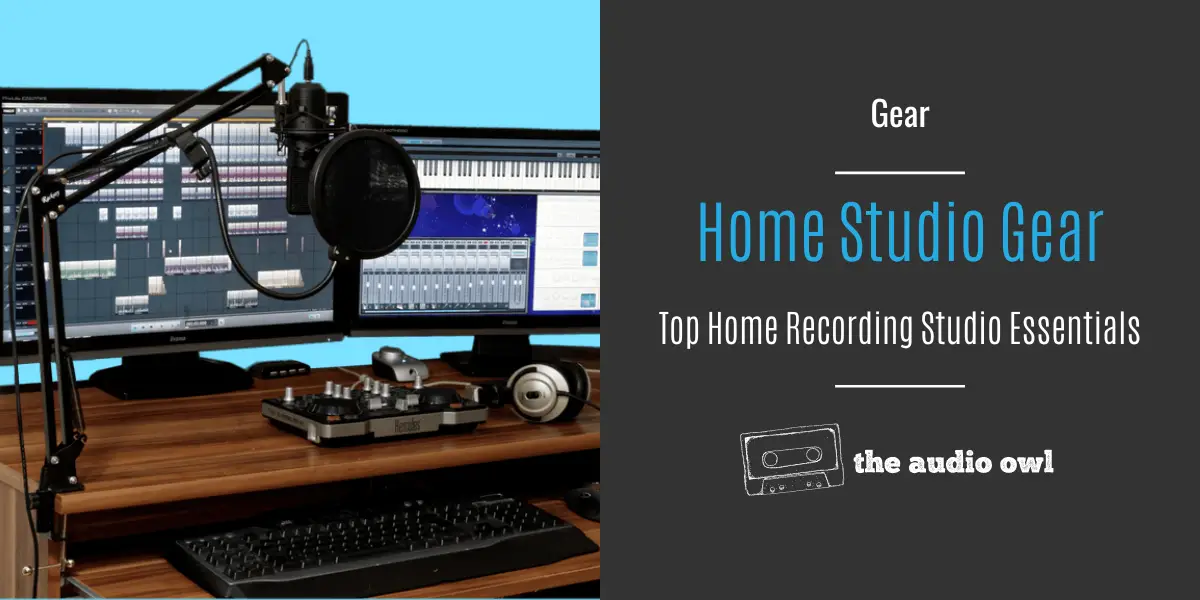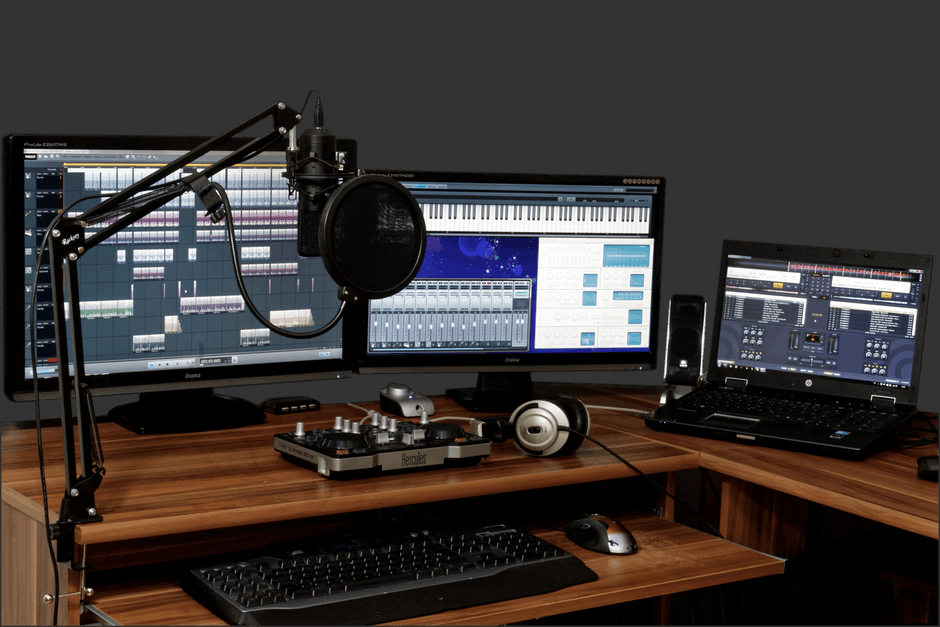According to the Recording Industry Association of America, the recorded music revenues in the United States grew for the fifth year in a row and reached $12.2 billion.
As this industry has become more popular, more people have found that you can produce high-quality records in a home recording studio rather than paying another recording studio. Do you want to learn more about what it takes to set up a home recording studio?
Keep reading this guide for the top 10 essential equipment you need to make the best home studio set-up!
This site contains affiliate links to products. The Audio Owl may receive a commission for purchases made through these links.
1. A Computer
When you are creating music in a home recording studio, the most important piece of equipment you need is a computer. You can use your personal computer as a hub for your music recording.
Using a computer, rather than a tablet or smartphone, gives you much more control over your audio production. Plus, they are much more functional and easy to use.
It doesn’t matter what type of computer you need unless you use it for bigger projects, like video production. You simply need to make sure you have a fast processor with plenty of RAM when you use your computer for audio recordings.
2. Microphones and Stands
Next, you must invest in microphones and stands for your home recording studio. There are many different types of microphones that you need to use for music production.
This includes condenser microphones, dynamic microphones, and ribbon microphones. Each of these has different roles in audio production, whether you need to use microphones for vocals or other instruments.
For example, condenser microphones are more sensitive, which makes them a good option when you are recording vocals or when you are recording instruments.
Dynamic microphones are not as sensitive, so these are best when used for recording loud sounds. This is perfect for instruments like drums or electric guitars.
3. Audio Interface
Having a digital audio interface, also known as a digital audio converter, is necessary to help you work on your recordings on your computer.
This converter allows you to turn analog signals from your recordings into digital files that are compatible with your computer. An audio interface will also route audio from your computer to all of your other studio monitors and can connect many different types of audio sources.
If you are using many different audio sources, like vocals and several instruments, you will need more inputs for your audio interface.
4. Digital Audio Workstation (DAW)
A digital audio workstation, also known as a DAW, is a vital piece of equipment if you are recording music on your computer. It is a special type of software that allows you to record your audio, edit, and mix your tracks into a single file.
This allows you to create professional-sounding music. For example, you can manipulate the audio to add reverb or other effects to your music. There are many free or inexpensive DAWs available, which makes it easy for beginners to create high-quality music.
5. MIDI Keyboards
A MIDI keyboard is a beneficial tool that gives you more control over your editing and music production. They help improve workflow in your music studio by sending commands to other musical devices and computers in your studio.
You can use them to edit music note by note and alter sounds to make them sound authentic rather than robotic.
Read more about MIDI Controllers that work with Ableton Live.
6. Studio Monitors & Headphones
Studio monitors and headphones are designed for professional audio production and are essentially loudspeakers. Similar to studio headphones, these monitors allow you to hear your audio more clearly.
This makes it easy to identify flaws in your audio quality and correct them before you finalize your audio file. These studio monitors are different than standard speakers and are designed to provide flat frequency response.
Using studio monitors and headphones will give you a purer sound that makes it easier to accurately mix your audio. This way, you will have a more accurate idea of what your audio sounds like and what needs to be changed.
7. Acoustic Treatment
Acoustic treatment or sound treatment is necessary for a home studio, as your home may not be quiet enough to record high-quality audio.
Often, home recording studios are set up in an office space or a spare bedroom. Without the right sound treatment, your microphone may pick up other sounds while you are recording.
There are many inexpensive treatments you can use to keep your recordings studio quiet and will absorb any other sounds.
8. Pop Filters
Pop filters are a necessary microphone accessory to use when you create a home recording studio. It is a material that goes between a microphone and the singer’s mouth and will prevent popping sounds from getting recorded when a singer uses plosive sounds, like “p” or “b.”
Using a pop filter will help you minimize the hissing sounds as well that come from overly enunciated “s” sounds.
9. Backup Hard Drive
Because audio recording takes up so much space on your computer, it is best to invest in a backup or external hard drive.
This will not only keep your computer running more smoothly, but it will also protect your data if something happens to your equipment. This way, you will always have an extra copy of your recordings!
10. Synthesizers
Finally, you need to invest in a synthesizer for your home recording studio. What is a synthesizer? Synthesizers are a type of electronic instrument that uses digital processing to produce sound. It makes it easy to artificially reproduce the sounds that acoustic instruments make.
This way, you can easily compose electronic music without having to use a physical instrument. There are many different types of synthesizers, so make sure you learn about the types of synthesizers to determine what kind of synthesizer to buy.
Read more about buying a new synthesizer.
Creating a Home Recording Studio? We Can Help
An in-home studio for recording is necessary whether you create music, podcasts, or any other audio content. Learning what to include in your DIY home studio can help you create high-quality audio without paying for a professional studio.
If you are looking for equipment for your home recording studio, The Audio Owl can help! We provide high-quality drum and instrument samples and can help you become a better producer.
Contact us today to learn more about music production and our free sample packs!
Author: Mike P
Hi! My name is Mike! I’ve been an apartment producer/musician for 10+ years. I’ve played in punk bands, released EDM tunes on Beatport and iTunes, and have a semi-successful stock music portfolio. Read more…




